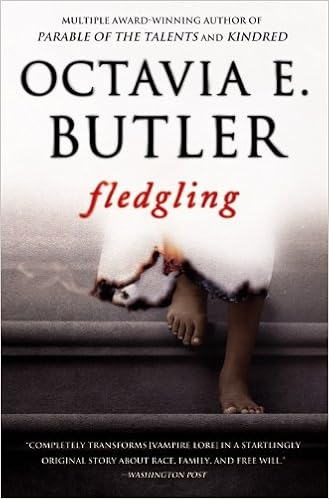A masterfully written story dealing with consent, mutual need, and racism, but read further before you decide if this NSFW book is right for you.
"Fledgling" by Octavia E. Butler

Readers considering this book need to know about the "underaged" consensual sex. We learn early on that Fledgling's narrator "looks 10 or 11," and then she seeks out and has sex with a young man who firsts protests that he's uncomfortable with her apparent age. Many readers will correctly expect consent themes in a vampire book (more on that later), but that particular detail deserves mention.
Now, by the time we encounter sex in Fledling, we're made to understand that, if anything, it's the humans she meets that are at a power disadvantage--physically as well as physiologically. Later, we're told by one of her kind (an "Ina") that she's at an appropriate age for her kind to explore sexuality. Her appearance is used to accentuate her otherness, and its certainly not the first speculative fiction novel to play with the appearance and sexuality of "nonhuman" creatures. We're not surprised to learn later that our MC is much older than she appears, but its worth noting that she's physically incapable of having children yet, which harkens back to "10 or 11" territory.
Fledgling tackles a lot of fascinating power and consent issues that are expertly woven together. For example, humans become addicted to the Ina who feed on them as part of a symbiotic relationship, and these human symbionts do have to obey their vampire's commands. On a political powerplay level, our MC is genetically superior to all other vampires, yet the violent politics of ancient biogtry threaten her life from the outset.
All-in-all, Fledgling is a powerful, engaging story about how racism unfairly puts the burden of knowledge and preemptive action on its victims, with death waiting on the other side of failure.
Butler's thought-provoking take on vampire lore questions the conflation of pleasure with need and sex, and power with the right to order and possess. Ina communities are essentially polyamorous to suit their need for several blood donors (symbionts), and symbionts receive the benefits of a longer life with faster healing. Throw a bit of ageism in there, where older Ina try to dismiss our MC as a "child" who is too mentally damaged by her trauma to testify against her oppressors, and one can see why Butler chose to create a protagonist that's younger than the elders in charge of the justice system. Since age-ism is a thing, can we call the dismissal of victims trauma-ism, or is there another term? Whatever you call it, I much appreciated how Butler wove both issues naturally into the text.
However, I would have preferred a protagonist who appeared older. That one line gave me pause and nearly caused me to quit reading, and reading the rest of the book hasn't convinced me that this detail was necessary. Having a sexually active character who appears "10 or 11" sounds like pedophilia. Many books do feature sexually active minors, but usually in the 14+ range, an age where real teens are sometimes sexually active (40% of never-married teens ages 15-19 are sexually active in the US). The only reason the book didn't lose me so early on is because I knew that the narrator would end up being older than she appeared, and I'd heard Octavia E. Butler recommended many times. While it is important to the story that other Ina see her as a child, this particular detail seemed to be designed for shock value. I fear that this detail potentially overshadows other aspects of the book. If not for this one detail, I would whole-heartedly recommend this book for anyone who does not mind the NSFW exploration of consent and need. I found the book thought-provoking and moving overall, yet this makes me want to find a similar author handling similar themes, rather than necessarily pick up another book by Octavia E. Butler.
I'm open to suggestions for further reading--either of books by Octavia E. Butler featuring "older" characters, or books like Fledgling by other authors.

No comments:
Post a Comment